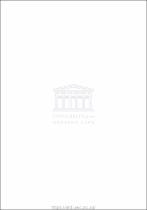Betrokkenheid van lidmate by die kerk as n..funksie van lidmaathoudings ten opsigte van Godsdiens en van lidmaatpersepsie van die kerk se Psigososiale klimaat. Betrokkenheid van lidmate by die kerk as n..funksie van lidmaathoudings ten opsigte van Godsdiens en van lidmaatpersepsie van die kerk se Psigososiale klimaat.
Abstract
The aim of the present study was to determine whether church involvement can be conceptualized as a function of both organizational
and personal factors. For the purposes of this study the psychosocial climate of the church served as an organizational factor while religious attitudes served as personal factors. A further aim of the study was to determine to what extent the church can be seen as a support system that serves as a buffer against stressors. Subjects consisted of 214 congregation members of 10 different churches that were spread out over the areas of Bellville-South, Kuilsriver and Belhar in the Cape Peninsula. Subjects completed five questionnaires: the Church climate scale (CCS), the Involvement in the church scale (ICS), the Survey of religious attitudes (SRA), a psychological well-being questionaire (RIF) and a
biographical questionnaire. The relationship between the different variables were determined by means of product moment correlations, stepwise multiple regression and Chi-square analyses. The analysis of the significance of the differences between more involved and less involved church members was performed by means of Rotelling's T2 statistic. It was found that, according to the psychometric measures
applied: the dimensions of the psychosocial climate of the church plays a limited role in the prediction of church insignificance as a predictor of church involvement in the final multiple regression analysis which involved all independent variables simultaneously. Orthodox religious beliefs had a positive relationship with church involvement, while inner religious conflicts had a negative relationship with church involvement. there was no relationship between church involvement and psychological well-being. orthodoxy, income, normative clarity and educational qualifications were the only significant predictors of church involvement. more involved and less involved members differed significantly and the difference between the two groups can be attributed to orthodoxy of religious beliefs. Although the results of the main investigation did not fully confirm the researcher's expectations, the intercorrelations between the different variables produced a number of interesting findings. The Church climate scale produced the following significant correlations with the other variables: ( i) "Normative clarity" correlated negatively with the experience of inner religious conflicts as well as the experience of anxiety, depression and global psychological well-being. It however correlated positively with educational qualifications. Chi-square analyses further showed that married persons, received a high level church. compared to unmarried per the persons, of "normative clarity" within "Sense of community" correlated positively with the level of religious orthodoxy and negatively with the experience of anxiety. (iii)"Social concern correlated positively with the level of religious orthodoxy as well as with sex (men percieved a higher level of social concern within the church than women) .
(iv) "Openness to change" correlated positively with the level of religious orthodoxy as well as with sex (men percieved a higher level of social concern within the church than women)

